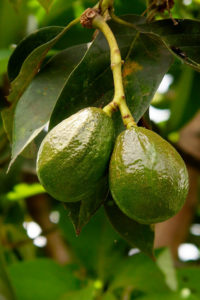 Avocados have been cultivated by the Aztecs in Central America since approximately 500 B.C. Spanish settlers changed what the Aztecs called “ahuacatl” to “aguacate,” which eventually became “avocado.”
Avocados have been cultivated by the Aztecs in Central America since approximately 500 B.C. Spanish settlers changed what the Aztecs called “ahuacatl” to “aguacate,” which eventually became “avocado.”
With its tropical climate and fertile volcanic soil, Mexico is the world’s top producer of avocados. In fact, the Mexican state of Michoacán supplies half the world’s avocados. These perfect growing conditions allow avocado trees to bloom twice a year, making avocadoes available all year round.
Health benefits of Avocado Oil
Packed with more than 20 vitamins and minerals, avocados are one of the world’s healthiest foods. Avocados are high in potassium as well as vitamins A, E, and D. Additionally, we’re sure you’d be happy to learn that avocado oil has been found to have the highest concentration of monounsaturated fats, which are the “good fats” in our diets.

The antioxidants and beta-sitosterol found in avocados help to reduce the risk of heart disease and cancer, while maintaining eye health in aging adults. Avocados are also rich in monounsaturated fats, which help balance cholesterol levels. An essential nutrient for bone and cardiovascular health, the magnesium found in an avocado is also known to reduce migraines and prevent type II diabetes.
The Omega-3 Fatty Acids in avocados may reduce inflammation, high cholesterol, high blood pressure, depression and arthritis. Lastly, avocados contain soluble fiber and foliate, both of which aid in improving overall heart health.
Avocados are rich in:
- Monounsaturated Fats: Monounsaturated fats are considered the good fats in our diet. Oleic acid is the monounsaturated fats in avocados and avocado oil. Research has shown that monounsaturated fats help reduce the “bad” cholesterol LDL and help raise the “good” cholesterol. The Mediterranean diet is composed of monounsaturated fats which research has shown to be a healthy lifecycle.
- Antioxidants: Diets rich in antioxidants are documented to reduce the risk of cancer and heart disease. Antioxidants protect and repair our cells from being damaged by free radicals.
- Magnesium: An essential nutrients for healthy bones, the cardiovascular system, (regulation of blood pressure and cardiac rhythms) prevention of migraines, and prevention of type II diabetes.
- Beta-Sitosterol: Along with peanut butter, cashews, almonds, peas and kidney beans, avocados are one of the best sources of beta-sitosterol, a so called phytosterol, from whole foods. Phytosterol is the plant equivalent of cholesterol in animals. Because beta-sitosterol is so similar to cholesterol, it competes for absorption with cholesterol in our bloodstream. Beta-sitosterol also appears to inhibit excessive cell division, which may play a role in preventing cancer-cell growth. In both animal and laboratory studies, this phytonutrient helps reduce the risk of cancer.
- Omega-3 Fatty Acid: Also known as polyunsaturated fatty acid, omega-3 fatty acid is essential to human health. Omega-3’s are not manufactured by the body but in the foods we chose in our diet. Diets rich in Omega-3’s are shown to reduce the risk of inflammation, high cholesterol, heart disease, blood pressure, diabetes, depression, arthritis and many other health conditions.
- Lutein: Lutein is an antioxidant that research has shown to help maintain good eyesight as we age.
- Folate: One cup of avocados contains 23 percent of the daily value for folate. Various studies have shown a correlation between diets high in folate and a reduced risk of cardiovascular disease and stroke.
- Fiber: Avocados have the most soluble fiber-the best fiber for lowering cholesterol, than any other fruit.
History of the avocado
It is estimated that avocados have been cultivated since 500 BC in Central America. The Aztecs referred to avocados as the “Kings Butter.” The Aztecs called the fruit, “ahuacatl.” When the Spanish explorers came to Central America they could not pronounce the word “ahuacatl” so they called the avocado, “aguacate.” Ahuacatlan Avocado Oil (pronounced “awa” “cota” “lan”) derives its name from the Aztec original name which means “Land of the Avocado.”
Avocado production
Mexico is the world’s top producer of avocados. The Mexican state of Michoacán, is where most avocados are grown in Mexico. This region supplies half the world’s avocado’s. With its tropical climate, abundant rain and volcanic fertile soil it is perfect for the avocado. In fact, each tree has two blooms a year in this ideal climate. Avocados are available all year long due to 4 different growing seasons in this region. Every acre of avocado’s requires 1.3 million gallons of water per year. California ranks second in world production of avocados.
About the avocado
The avocado tree is an evergreen tree, which reaches up to 70 ft tall. Avocado trees can produce fruit all year round. It takes 12 months from blooming of the avocado bud to the harvest of the fruit. The average tree produces up 500 avocados and up to 200 pounds of fruit a year. Avocados for commercial operations are picked unripe. Avocados are hand picked with using 30 foot ladders and poles to reach high up in the trees.
Is it a fruit or vegetable?
Many people believe incorrectly that avocados are a vegetable because they are used in salads, hamburgers and dips. The truth is that avocados are a fruit and more specifically a “berry,” with a single seed.
The oil
The average avocado contains around 25% oil. It takes up to 25 lbs of avocados to make a single 33.6 ounce bottle of avocado oil. Refined Avocado oil has the highest smoke point of all plant oils at 520 degrees F. Avocado oil is also excellent for skin care because it is rich in vitamin A, E and D. Note how avocado oil on your skin is quickly is absorbed.
From nature with love
Avocados have over 20 vitamins and minerals and therefore considered to be one of the world’s most healthiest foods. An avocado has 60% more potassium than a banana on a per ounce basis. Avocados also have the most protein of any fruit. If you were stranded on a desert island and could only have one source of food you would be wise to chose the avocado. You could live off the avocado and be in good health, until you were rescued.
Celebrate
Each year, during the Super Bowl, American eat around 53 million pounds of guacamole. From end zone to end zone the guacamole would cover the football field 5 feet deep. The Super Bowl ties with Cinco de Mayo as the highest day for avocado consumption each year.
